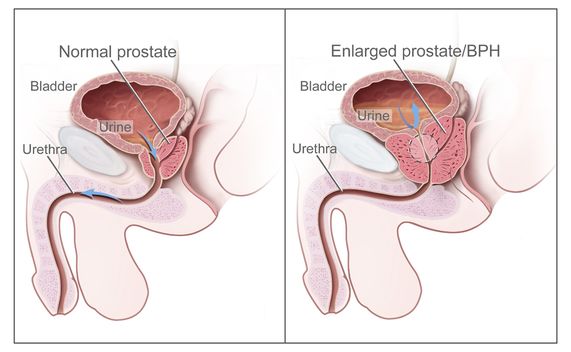Benign Prostatic Hyperplasia (BPH)

Benign Prostatic Hyperplasia (BPH): Symptoms, Diagnosis, and Treatment
Benign prostatic hyperplasia (BPH) is a non-cancerous enlargement of the prostate gland that affects men as they age, causing urinary symptoms due to urethral compression. While not life-threatening, untreated BPH can lead to complications like urinary tract infections (UTIs) or kidney damage.
Symptoms of BPH
Symptoms vary by severity and may worsen over time:
- Lower Urinary Tract Symptoms (LUTS):
- Urinary frequency, nocturia (nighttime urination), and urgency.
- Weak or interrupted urine stream, dribbling, or straining to urinate.
- Incomplete bladder emptying or urinary retention.
- Less Common Symptoms:
Note: Symptoms may improve, stabilize, or progress unpredictably34.
Diagnosis
Diagnosis combines clinical evaluation and tests:
- Physical Exam:
- Digital rectal exam (DRE): Assesses prostate size and texture (smooth vs. lumpy).
- Bladder palpation: Checks for distension.
- Blood Tests:
- PSA: Elevated levels may indicate BPH or prostate cancer; requires further testing (e.g., biopsy)25.
- Kidney function: Creatinine or BUN to rule out kidney damage5.
- Imaging:
- Ultrasound: Measures bladder residual urine volume.
- Uroflowmetry: Assesses urine flow rate and bladder emptying24.
- Exclusion of Other Conditions:
- Urinalysis: Rules out UTIs or bladder stones.
- Multiparametric MRI: Used if PSA is elevated to exclude cancer25.
Treatment
Treatment depends on symptom severity and quality of life:
- Watchful Waiting:
- Medications:
- Minimally Invasive Procedures:
- Laser therapy, microwave ablation, or transurethral resection (TURP).
- Surgery:
Complications
- Urinary Retention: Requires catheterization.
- UTIs, bladder stones, or kidney damage from prolonged obstruction14.
- Prostate Cancer: Elevated PSA warrants biopsy to exclude malignancy25.
Risk Factors
- Age: Risk increases after 50 years.
- Family History: Genetic predisposition.
- Obesity, diabetes, or sedentary lifestyle37.
Conclusion
BPH is a common age-related condition requiring tailored management. Early diagnosis via DRE, PSA testing, and imaging helps differentiate it from prostate cancer, while medications or interventions alleviate symptoms and prevent complications.
Consult with Our Team of Experts Now!
At DrStemCellsThailand (DRSCT)‘s Anti-Aging and Regenerative Medicine Center of Thailand, we emphasize comprehensive evaluations and personalized treatment plans of Cellular Therapy and Stem Cells for managing various health conditions. If you have questions about Benign Prostatic Hyperplasia (BPH) or would like more information on our services, consult with our experts today!















